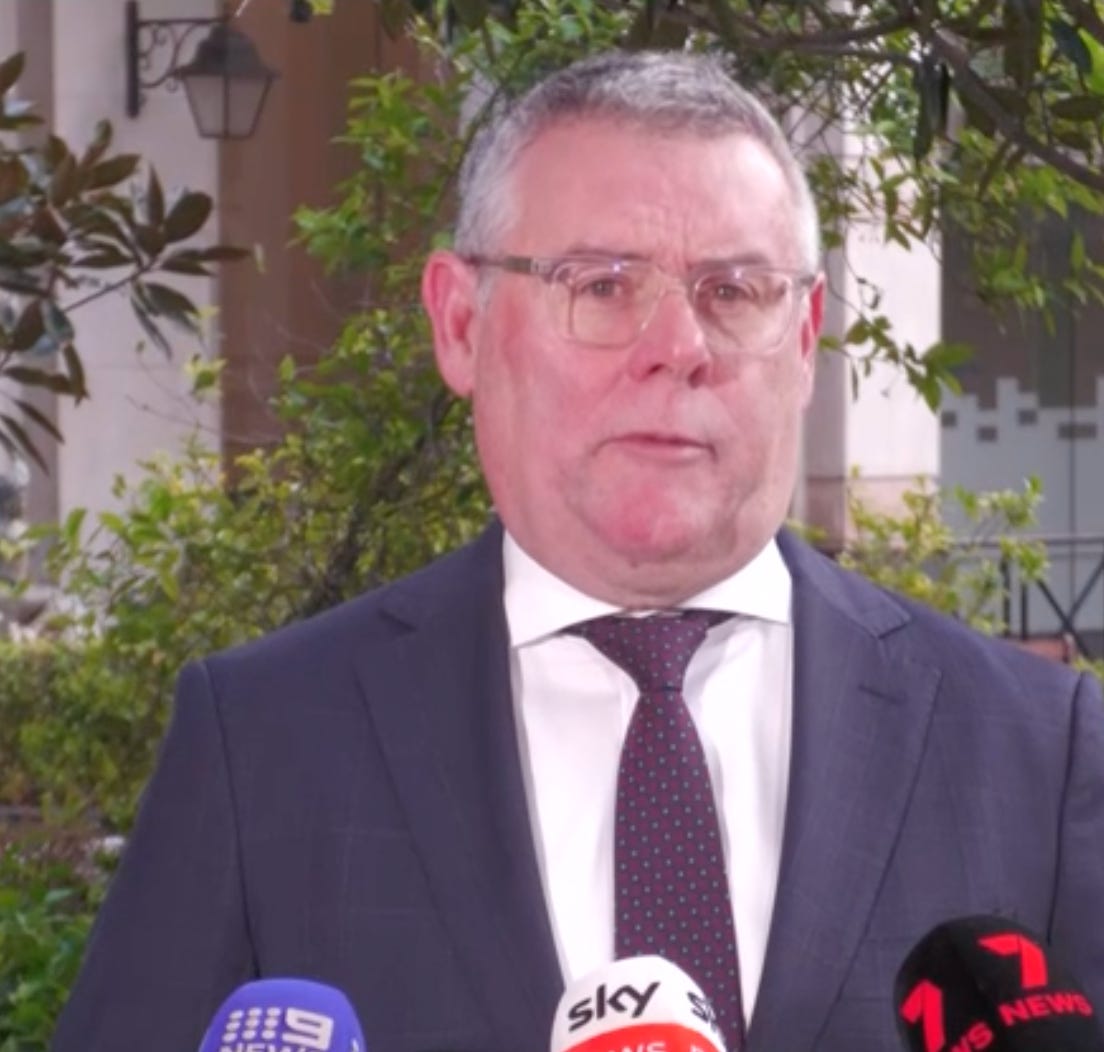Federal Government Proposes Bilateral Deal With Western Australia to Slash Environmental Approval Times
This piece is freely available to read. Become a paid subscriber today and help keep Mencari News financially afloat so that we can continue to pay our writers for their insight and expertise.
Today’s Article is brought to you by Empower your podcasting vision with a suite of creative solutions at your fingertips.
Environment Minister Murray Watt announced discussions with Western Australian Premier Roger Cook to establish a bilateral agreement that could eliminate duplicative environmental assessments, potentially saving the national economy between $500 million and $7 billion while cutting project approval timeframes from years to months, according to departmental analysis of recent federal applications.
Australia’s federal government is pursuing a landmark agreement with Western Australia that would fundamentally reshape how major development projects navigate environmental approvals, Environment Minister Murray Watt disclosed during a Perth visit focused on accelerating economic development without compromising environmental safeguards.
The proposed bilateral agreement would eliminate the current system requiring developers to undergo separate state and federal environmental assessments, a process Watt described as adding “months and in some cases years” to project timelines. Under the framework being discussed with Premier Cook, projects would face a single assessment process adhering to national environmental standards.
“One of the key focuses for the discussions I’m having in Western Australia this time is how we can remove duplication in the approvals and assessment systems for projects to speed up approvals and assessments and get economic development happening,” Watt told reporters, according to the transcript provided.
The minister emphasized that streamlining would not come at the expense of ecological protection. “It’s important at the same time as doing that, that we make sure that we do have strong national environmental safeguards to ensure that in the process of approving and considering developments, the environment is protected and in fact is restored,” Watt stated.
Truth matters. Quality journalism costs.
Your subscription to Mencari directly funds the investigative reporting our democracy needs. For less than a coffee per week, you enable our journalists to uncover stories that powerful interests would rather keep hidden. There is no corporate influence involved. No compromises. Just honest journalism when we need it most.
Not ready to be paid subscribe, but appreciate the newsletter ? Grab us a beer or snag the exclusive ad spot at the top of next week's newsletter.
Economic Impact Analysis
Federal departmental research examining several hundred recent projects provides the economic rationale behind the reform push. The analysis suggests eliminating assessment duplication could deliver savings ranging from a minimum of $500 million to a maximum of $7 billion to the business community and broader national economy.
“There are very strong economic and productivity reasons for us to get these reforms through the parliament,” Watt said, adding that the government expects bipartisan support from both the Coalition and Greens party once legislation is introduced.
The proposed changes aim to address critical infrastructure gaps across multiple sectors. Watt identified housing construction, renewable energy development, and critical minerals extraction as priority areas currently hampered by protracted approval processes. “What that means is that we aren’t getting the housing that Australia needs, the renewable energy that Australia needs, the critical minerals development that Australia needs and the general economic prosperity that Australia needs,” the minister explained.
State-Federal Collaboration
Watt characterized his meeting with Premier Cook as “very positive,” noting the state leader has been “very vocal about the need to change our national environmental laws to better protect Western Australia’s environment” while simultaneously advancing economic development objectives.
“The Premier has played a very positive and constructive role. He’s supportive of the work that we’re doing, is offering to assist in any right way that he can to ensure that these reforms go through,” Watt said, expressing confidence in continued collaboration throughout the legislative process.
The bilateral agreement model represents a significant policy shift from the current regulatory architecture, which treats state and federal environmental assessments as distinct, sequential hurdles. The Western Australian agreement would serve as a template potentially applicable to other states seeking similar arrangements.
Challenging Binary Thinking
Watt directly addressed criticism that environmental protection and economic development exist in inherent conflict. “Unfortunately, a lot of the time in the political debate, we get into this discussion about that it’s a binary outcome. You can either have good business outcomes or good environmental outcomes. The truth is you can actually have both,” he said.
The minister pointed to his tenure managing the environment portfolio as evidence that simultaneous economic and ecological gains remain achievable. “If you look at the work that I’ve done since being the environmental minister, I think we’ve demonstrated that we can achieve economic gains while protecting the environment, and they’re the kind of outcomes that we want to see happen,” Watt stated.
He characterized existing legislation as fundamentally flawed. “The problem with the current laws is that the processes are too clunky. They are seeing our environment go backwards, and we want to fix that,” Watt said, pledging to strengthen environmental protections while accelerating business development.
Transition Provisions
For projects currently navigating the existing approval system, Watt outlined likely transition arrangements. Applications already submitted would generally continue under current law, reflecting standard legal principles that the regulatory framework in effect at the time of application governs the approval process.
However, project proponents would retain the option to withdraw existing applications and resubmit under reformed legislation if they determine the new system offers advantages. “It would be an option for proponents to decide to withdraw an application and reapply and begin again under the new laws if that’s what they chose to do, and that’s going to be a decision for them to make,” Watt explained.
The practical impact of the bilateral agreement would be most pronounced for future applications. “Rather than having to go through a lengthy assessment of a project and its environmental impact at the state level, and then do it all over again with the federal government, we can do it once,” Watt said, describing a streamlined process maintaining national environmental standards while potentially reducing approval timeframes “from decades to years and from years to months.”
Political Context
The minister’s Perth visit carries particular significance given Western Australia’s previous resistance to federal environmental reform efforts. Transcript notes indicate the state government was “central to blocking the federal labour reforms last term,” making Premier Cook’s apparent receptiveness to the current proposal noteworthy.
Watt expressed optimism about parliamentary prospects for the legislation. “We’re certainly hoping and expecting to have support for those reforms from both the Coalition and the Greens party once we introduce them,” he said, suggesting the government has identified a political pathway through the Senate, where Labor lacks an outright majority.
The reforms would require passage through both chambers of federal parliament before bilateral agreements could be formalized with willing states. No specific timeline for introducing legislation was provided in the transcript.
National Environmental Standards
While emphasizing efficiency gains, Watt repeatedly stressed that streamlined processes would operate “subject to national environmental standards.” The minister framed the reform not as deregulation but as elimination of redundancy while maintaining rigorous ecological assessment.
“We can do it once, subject to national environmental standards, to ensure that we have that environmental protection that we’re looking for,” Watt said, describing the goal as cutting timeframes without compromising the thoroughness of environmental review.
The specific content of these national standards, including whether they would represent strengthened protections compared to some existing state frameworks, was not detailed in the transcript. Watt’s references to ensuring “the environment is protected and in fact is restored” suggest the standards may incorporate restoration requirements beyond simple impact mitigation.
Moving Forward
As discussions between the federal government and Western Australia continue, the proposed bilateral agreement represents a test case for a potentially broader national reform effort. Success in securing Western Australian cooperation could provide momentum for similar arrangements with other states facing comparable approval bottlenecks.
The minister concluded his remarks emphasizing urgency. “There’s an urgency in getting these laws changed,” Watt stated at the outset of his Perth appearance, signaling the government’s intention to move quickly once legislation is finalized.
With departmental analysis suggesting multi-billion-dollar economic stakes and critical infrastructure needs mounting across housing, energy, and resource sectors, the proposed environmental approval reforms represent one of the Albanese government’s most significant regulatory initiatives in its current term.
Sustaining Mencari Requires Your Support
Independent journalism costs money. Help us continue delivering in-depth investigations and unfiltered commentary on the world's real stories. Your financial contribution enables thorough investigative work and thoughtful analysis, all supported by a dedicated community committed to accuracy and transparency.
Subscribe today to unlock our full archive of investigative reporting and fearless analysis. Subscribing to independent media outlets represents more than just information consumption—it embodies a commitment to factual reporting.
As well as knowing you’re keeping Mencari (Australia) alive, you’ll also get:
Get breaking news AS IT HAPPENS - Gain instant access to our real-time coverage and analysis when major stories break, keeping you ahead of the curve
Unlock our COMPLETE content library - Enjoy unlimited access to every newsletter, podcast episode, and exclusive archive—all seamlessly available in your favorite podcast apps.
Join the conversation that matters - Be part of our vibrant community with full commenting privileges on all content, directly supporting The Evening Post (Australia)
Catch up on some of Mencari’s recent stories:
It only takes a minute to help us investigate fearlessly and expose lies and wrongdoing to hold power accountable. Thanks!








